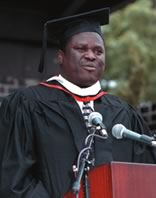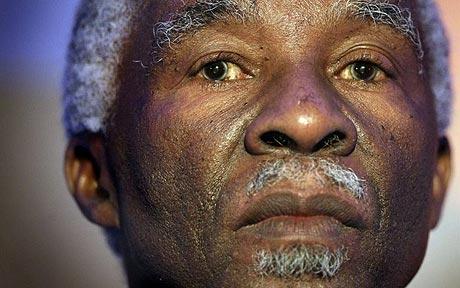Tall Order As Kenya Lobbies for UN Seat
by Dennis Onyango, The East African Standard.
Aug 28, 2005 (Nairobi) — Minister argues for the country on the strength of conflict resolution and peacekeeping efforts but others say continental link is weak.
The government has written to its diplomatic missions abroad instructing them to push for a permanent seat for Kenya in the United Nations Security Council.
The dispatch, dismissed by a Kenyan member of the Pan-African Parliament as too little too late, came as world leaders prepare to troop to New York to discuss, among other things, the restructuring of the UN Security Council.

Some African countries, including Kenya, hope to win both a permanent seat in the Security Council and the right to wield veto powers.
Yesterday, Ojodeh maintained that Kenya is putting a strong case to be given one permanent seat on the Security Council citing its peace efforts in Somalia, Burundi, Sudan and peacekeeping troops across the world.
“We are offering our candidature and we are serious,” Ojodeh said.
“We are lobbying now. We have just written to our ambassadors and asked them to push our case. We have just started lobbying because we finalised our decision only recently,” he added.
But even as the assistant minister made the assurance, which echoed Minister Chirau Mwakwere’s earlier announcements, Wycliffe Oparanya, a member of the Pan African Parliament, asked the government to get its priorities right and win recognition in Africa before eyeing the UN.

Even within the African Union, Kenya is not among the emerging influential group of nations informally called the “G5 of Africa” which will be controlling the continental organisation from next year. Oparanya attributed this to inefficiency at the Foreign Affairs Ministry.
South Africa, Nigeria, Libya, Egypt and Algeria will be contributing 70 per cent of the AU’s budget, from next year, while the rest of the Africa, including Kenya, will jointly provide the 30 per cent to meet the organisation’s budget needs.
The five nations proposed themselves and their offer could be ratified during the next AU Summit in Sudan next January.
According to the Butere MP, Kenya’s absence from “the G5 of Africa” undermines its push for a UN seat.
“The fact that we are lumped together with other struggling countries means we are not pushing hard enough on the international stage,” Oparanya said.
“Kenya should now be pushing to join Africa’s G5 first. When big things will be happening on the global stage, it is the G5 states that will be getting preference in Africa,” he added.
Kenya is competing with Egypt, Nigeria, Senegal and South Africa for a slot in the UN Security Council.
Last March, Mwakwere said Kenya would present a candidate for both the two permanent and five non-permanent seats in the Council.
The minister cited Kenya’s role in the Sudan and Somali peace talks as enough credentials for winning seats at the Security Council.
Ojodeh maintained yesterday that the country has excellent credentials in peace and security, two issues that are critical to the Security Council.
“We have helped create a government in Somalia. We rescued Sudan, sent troops all over the region, including Burundi. The world has to take us seriously,” the assistant minister said.
But Oparanya said it is a tall order.
“The way Kenyans are doing their things, they may not get anything at the UN. We politick here, and do nothing out there. Other countries are lobbying. Their ministers are moving from one country to another asking for support. But Kenyans are just talking here,” Oparanya reiterated.
“When there are international conferences, our rivals ask their officials at those meetings to mention the fact that they are running for a seat in the UN. I don’t know which Kenyan minister is doing that,” he added.
While acknowledging that Kenya’s role in the Sudan and Somalia has raised its profile, Oparanya said that “with luck, Kenya could only get a non-permanent seat.”
“The two permanent seats are likely to go to South Africa, which controls 40 per cent of Africa’s economy, and Nigeria, which controls the continent in terms of population,” Oparanya said.
But Ojodeh maintained that Kenya is a member of the AU team that is looking into the criteria to be used in selecting which African country should vie for the UN seats.
The 2005 World Summit, touted as the largest gathering of world leaders in history, runs from September 14 to 16 where states will pore over the three ideals developed recently by UN secretary general Kofi Annan, on top of the reorganisation agenda.
The ideals include Freedom from Want, Freedom from Fear and Freedom to Live in Dignity.
Under Freedom from Want, the UN will take another look at the controversial issues of debt relief and trade liberalisation, increases to the poor to finance infrastructure, health and education as part of the grand plot of cutting extreme poverty by half by 2015.
Under this arrangement, developing countries will be asked to device national strategies to meet the Millennium Development Goal and to facilitate transparent and accountable governance.
In return, developed countries will be asked to increase aid and reduce trade barriers, debt and other burdens that hamper development.
The UN is proposing to set up an International Financing Facility that would make official development assistance (ODA) more predictable and accessible.
Leaders meeting at the G8 Summit in early July agreed to increase annual aid flows by at least $50 billion as of 2010, with at least half of that increase to be directed at Africa, and to write off the debts of 18 of the world’s poorest countries.
Freedom from Fear will focus on making the world safer by improving collective security arrangements. Proposals include prevention of terrorism and the proliferation of weapons of mass destruction. Member states will be expected to reach an agreement on a universal definition of terrorism and to sign a comprehensive convention against terrorism. The UN will be considering establishing a Peace Building Commission that would support countries during their transitions from armed conflict to lasting peace and reduce the risks of war.
Under Freedom to Live in Dignity, the UN will discuss the idea that there can be no development without security, no security without development, and neither without the universal application and protection of human rights.
The proposals, described as “achievable,” in Annan’s report released last March, will run alongside the more emotional issue of reforming the Security Council.
Key among the proposals is the expansion of the Security Council to make it more inclusive and representative of the UN’s current membership.
On the table are two models for expanding the Council from 15 to 24. One model creates six new permanent seats and three new non-permanent ones. Another model creates nine new non-permanent seats.
Although consensus is desirable, it is not mandatory as long as two-thirds of UN Member States agree on the formula.
Africa is jostling for a permanent space in the expanded Security Council. A Summit of African leaders in Nigeria last February agreed that the continent should seek veto powers in the reformed UN.

Mbeki said it was the African Union’s position that there should not be “two degrees of permanent members” some with veto powers ad others who don’t.
Africa took the same stand during last June’s AU Summit in Libya where the Mbeki resolved to support efforts to enlarge the Security Council in both the permanent and non-permanent categories.
At the June Summit, the leaders resolved that the UN accords the new permanent members the same prerogatives and privileges as the current permanent members, including the right of veto. Africa asked for two permanent and five non-permanent seats in the Security Council and wanted the Security Council to increase its membership from 15 to 27, with 11 additional seats.
The reorganisation of the UN will also see the birth of a stronger role for the Economic and Social Council which would be expected to play a more active role in coordinating development policies.
The AU resolved at its June summit that under the expanded SC, Africa and Asia be given two permanent seats. Latin American and Caribbean States and Western European and other States were to get one permanent seat each.
